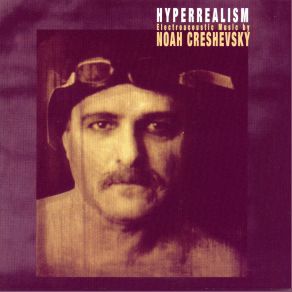Hyperrealism: Electroacoustic Music By Noah Creshevsky
Download links and information about Hyperrealism: Electroacoustic Music By Noah Creshevsky by Noah Creshevsky. This album was released in 2003 and it belongs to Electronica genres. It contains 8 tracks with total duration of 56:15 minutes.

|
|
|---|---|
| Artist: | Noah Creshevsky |
| Release date: | 2003 |
| Genre: | Electronica |
| Tracks: | 8 |
| Duration: | 56:15 |
| Buy it NOW at: | |
| Buy on iTunes $9.99 | |
Tracks
[Edit]| No. | Title | Length |
|---|---|---|
| 1. | Canto Di Malavita | 6:37 |
| 2. | Jacob's Ladder | 7:52 |
| 3. | Vol-au-vent | 5:10 |
| 4. | Hoodlum Priest | 6:05 |
| 5. | Novella | 7:29 |
| 6. | Ossi Di Morte | 11:29 |
| 7. | Jubilate | 6:23 |
| 8. | Born Again | 5:10 |
Details
[Edit]To say this album is eclectic or quite quirky would be an understatement, and a disservice to the definition of both words. Using small fragments of voices and musical samples, some no longer than one second, Noah Creshevsky begins this interesting journey with "Canto di Malavita," featuring a slightly Middle Eastern flavor with classical and operatic overtones. It sounds at times as if one is fast-forwarding a compact disc, resulting in a rushed and sometimes disconcerting feel. Strings fall on top of piano while other sampled blips and bleeps are also widely utilized. The piano is heard more as the song evolves and in some instances it is entirely fluid. "Jacob's Ladder" has its melody carrying the song as arias and more vocals are used in tandem with organ notes. Its softness works far better than the opening track, coming off at times like a Gregorian chant, although it becomes frantic near its conclusion. "Vol-au-Vent" opens like a fractured John Williams composition before including flute with vocals and organ again. One notable aberration is the rather funky guitar bits influencing "Hoodlum Priest" with a tenor-like vocal. From there, though, it begins to change into something like Pink Floyd's "Pow R. Toc H." with its bizarre vocal utterances. Perhaps the album's centerpiece is an 11-minute track entitled "Ossi di Morte" which seems to tell a lovely operatic narrative blending female and male vocals. It is also consistent throughout, something that is an aberration more than the norm on the album before its crescendo builds. After "Jubilate," which was commissioned and dedicated to Thomas Buckner, Creshevsky ends with "Born Again" that returns to a series of disconcerted pieces of sound. Overall it is a challenging album that dips its musical toe on both sides of the line between genius and insanity.